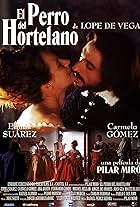Advanced search
- TITLES
- NAMES
- COLLABORATIONS
Search filters
Enter full date
to
or just enter yyyy, or yyyy-mm below
to
to
to
Exclude
Only includes titles with the selected topics
to
In minutes
to
1-28 of 28
- Portugal 1938. Pereira is the editor of the culture section of the Lisboa, an unaffiliated evening paper. There is civil war in Spain and the fascists are in power in Portugal, but he concerns himself only with his work (writing biographies of famous writers and translating French novels) and ignores what is going on around him. He hires Monteiro Rossi, an idealistic young man in love with a beautiful communist, as an assistant. He reluctantly helps them when they begin to get into trouble due to subversive activities. Eventually events force him to take a stand.
- Javi and his friend Carlos snoop around an old house on the way home from school. According to his brother Juan this is a haunted house and one can hear the voices of the dead. Later he is intrigued with a room which is always closed (the room where his father was found dead). He is so interested in these mysteries that he starts to investigate all the secrets of these dead people and their stories.
- Having taken a fancy to her secretary, Teodoro, spunky young beauty Countess Diana of Belflor is alarmed to learn of his engagement to one of her maids, Marcela. She intervenes to separate them by steering Marcela's affections to another court flunky, Fabio, and Teodoro's admiration in her own direction. While the extent of her designs on him wavers uncertainly, Diana's attentiveness to Teodoro nonetheless provokes jealousy from her noblemen suitors. They enlist the upstart's resourceful confidant Tristan to bump him off. But he instead hatches a plot to pass Teodoro off as the long-lost son of an ailing count Ludovico, thus elevating his friend to Diana's level.
- Sicily 18th century, Marianna Ucria is a 12-year-old deaf-mute from an aristocratic family of Palermo. Aged 13, she is married to a middle-aged uncle, Duca Pietro. She is repulsed by him, but at 16 years she already gives him three daughters. During her 20s she is instructed by a French tutor, which teaches her philosophy and all the new ideas that tour around Europe. She also has to manage, after Pietro's death, a relationship with her servant's brother (and following scandal). In her mature age she finally discovers and understands the terrible secret behind his handicap.
- In a village inexplicably haunted by a plague of zombies, Lucio, an honest worker, is the only person who can fight them. He has matrimonial problems and hides Ana, his adorable wife, now transformed in a horrible zombie with a violent behaviour and a bad attitude, in the basement of his house. This situation is temporarily forgotten in the local bar, where the strange inhabitants of the village get refuge. It's here where Lucio discovers again another chance for love in the relationship he starts up with Nancy, but the relation is threatened by the strange creatures and by the mortal jealousy of his wife. Will Lucio handle all his problems with the power of a gun and a cutlass?
- Two actors performing in Strindberg's "Inferno" as God and Lucifer are also competitors in real life. One of them, Henrique, is spiritually-obsessed with John Wayne and his way of walking. He and de Dieu, his fellow actor who plays Lucifer and also directs the Strindberg play, engage in a philosophical and spiritual tug-of-war, especially when they meet an author named God who has plans for another drama to feature both actors.
- A glimpse into the lives of those who live alongside the Sud Express, a train line running from Paris to Lisbon.
- Weekly news show about movies. "Cinemagazine" covered all the major film festivals, the shootings of portuguese and foreign films in Portugal and interviewed all major directors and actors that visited de country. Among them Jean-Luc Godard, Dennis Hopper, Christopher Walken.
- During a period in the 1940s and 1950s when backward Portugal produced only a handful of films and its theatres were poorly attended, Leitao de Barros made his mark as a director with a certain realism and a certain historical seriousness.











